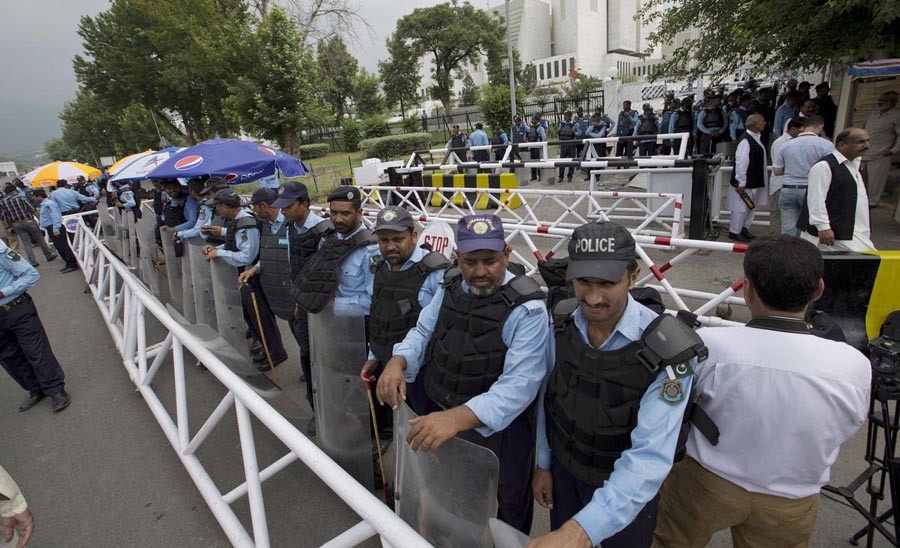
Corruption thrives unchecked because constitutional restraints on the jurisdictions of executive, legislature and the judiciary have not been working

Unfortunately, Pakistan’s polity betrays more than a semblance of "state capture" by its ruthless civil and military elite. We face the dire scenario where the ruling elite extract resources by abusing power and then use these resources to further preserve/expand their hegemony. State capture is termed as such because it militates against the principles of a modern state by distorting its functioning and causing institutional decay. A brief description of its chief indicators in Pakistan is in order here.
First, what practitioners term "petty corruption" is rampant in Pakistan. In their interface with citizens, lower/mid-level officials who control access to basic services (ranging from law&order to property transactions and from education to electricity provision) charge illegal rents of varying magnitude. Petty as it maybe, such corruption, often motivated by the need of grossly underpaid officials to meet their household expenses, disproportionately hurts the poorest.
Second, "grand corruption" involving senior public officeholders, including politicians and civil and military bureaucracy continues unabated. It is a misguided perception that such corruption is only about proven financial kickbacks (for instance through open violation of procurement rules), and hence appears to have been watered down during the new regime. In reality, high-level corruption occurs more frequently at the policy formulation end of politics. It involves the abuse of laws/regulations and the tailoring of policies to suit vested interests. An example is the "lawful" induction of military officers in civil administration bypassing all systemic channels.
Sometimes, the absence of a policy/legal framework or its lax implementation causes serious damage but barely registers as corruption as the layman understands it. The failure of successive regimes, including the present government, to bring the filthy rich into the tax net is an example of grand corruption at its worst.
The co-existence of petty and grand corruption is a lethal mix. The systemic corruption that has pervaded our social, political and economic fabric has nurtured a formidable pyramid of upward extraction in Pakistan.
Third, civic engagement by citizens, civil society organisations (CSOs) and media to exact accountability (popularly known as "vertical accountability") is not being supported by the state. Foremost, no meaningful accountability is possible without ensuring availability of a minimum quantity and quality of information. In Pakistan’s case, a solid evidence base and direct interaction with government officeholders are largely being denied to the civil society. Participatory public policy making, participatory budgeting, public expenditure tracking and citizen monitoring and evaluation of public service delivery remain largely alien concepts. The efforts by CSOs to enhance awareness about legal rights and available services remain limited in impact and sustainability.
Fourth, weak citizen involvement in public commissions and hearings, advisory boards, oversight committees and reform-oriented task forces has obstructed improvement in self-imposed accountability within the state machinery. Governments cannot be relied upon to respect rules and institutions that constrain their own ability to act unless they are subjected to accountability imposed from outside - by citizens. No wonder, therefore, that constitutional restraints on the jurisdictions of executive, legislature and the judiciary have not been working in Pakistan.
The fiscal accountability mechanisms of auditing and financial accounting do not deter too many from blatant rent seeking. The less said about the implementation of public service codes of conduct and the performance evaluation of civil servants the better. Also pro-active as the higher judiciary maybe, there are serious question marks about the performance of the lower courts and anti-corruption agencies, including the National Accountability Bureau (NAB).
Finally, the glaring manifestation of the virtual breakdown of the accountability cycle is that the general elections barely serve as legitimate channels of political influence and interest mediation. The electoral cycle has not been buttressed by "vertical accountability" to render it free, fair and transparent. When elections get subverted, citizens tend to lose trust in public institutions and ultimately in democracy itself. The pinnacle of decay may not yet have been reached in Pakistan but public surveys pinpoint the strong perception that most state institutions are nowhere close to achieving their constitutional purpose.
Petty corruption and generic accountability issues can be addressed through institutional reforms designed to improve transparency. However, systemic corruption and structural accountability issues are not amenable to treatment through the formal legal framework. Nullifying "state capture" thus entails modifying the incentives of the political elite and key economic interests seeking to influence them.
Reformers are divided in opinion about the remedy: radical political reforms or gradual and more democratisation? In Pakistan, there is no evidence of a strong political will for the radical agenda. This leaves us with gradual and more democratisation - many successive elections and allowing governments to complete their terms. Make no mistake though, the path will be painfully slow.
A damning statistic of the grave implications of "state capture" is provided by a recent World Bank report through a simple income growth projection. In Thailand and Philippines, it will take 40 years for the poorest 40 percent to witness a reduction in their income gap from the population average. In Pakistan, the income growth rate of the bottom 40 percent is so dismal that they will be lucky if their incomes start converging even in the next 150 years.